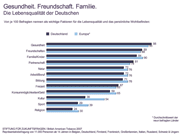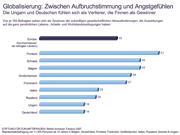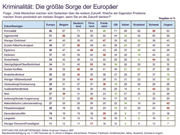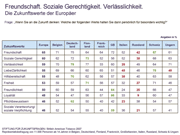Globalization: Between a sense of new beginnings and feelings of fear
The Hungarians and the Germans feel like losers, the Finns like winners.
Globalization has become a key term of the 21st century. Who are the winners and losers in a globalized world? The term globalization evokes highly contradictory feelings among people in Europe: One-third of Europeans see themselves as winners (33%) of this development; one in three Europeans even perceives globalization as a liberation from overly restrictive and long-outdated borders. A sense of optimism prevails, paving the way to a more livable future. Conversely, one in five citizens sees themselves as a loser (21%). Only on one point do all Europeans agree: The process of globalization can no longer be stopped, let alone reversed. This is one of the findings of the first European study, in which the BAT Foundation for Future Issues surveyed a representative sample of 11,000 people aged 14 and over in nine countries (Belgium, Germany, Finland, France, Great Britain, Italy, Russia, Switzerland, and Hungary) about their hopes and fears for the future.
Within individual European countries, the effects of globalization are viewed very differently: Over half of Finns (511,000) consider themselves winners. Belgians (431,000), Swiss (431,000), and British (391,000) have a similarly positive outlook on the future. And among the French (371,000), Italians (251,000), and Russians (241,000), hopes of benefiting from globalization outweigh fears. The situation is different, however, for Hungarians and Germans. In both countries, not even one in five (191,000 in each country) believes in positive effects on their future lives. "In both countries, the problem is clearly not globalization itself, but rather the degree of inequality and the subjectively perceived unfair distribution of the benefits of globalization between winners and losers," says Prof. Dr. Horst W. Opaschowski, the scientific director of the Hamburg-based foundation. "Citizens have doubts as to whether the distribution is socially just and fair."„
Health. Family. Friendship.
Quality of life in Europe
The most enduring and sustainable way to secure the future for all Europeans, the study shows, is undoubtedly securing their quality of life. A happy life primarily depends on one's own health (951), family (901), and friends (881). Partnership (781), nature, education, and work (each 761) follow somewhat less frequently. Consumption and leisure (each 651) are considered important by only two-thirds of respondents. Religion as an indicator of personal well-being is mentioned by only one-third (301), and even sports (391) enjoy greater popularity.
The project manager of the new European study, Dr. Ulrich Reinhardt, identified large discrepancies within the surveyed countries:
- Family, consumption, and money are particularly important to Russians: Russia is the only country where family (90%) is ranked first, and consumption opportunities (74%) also score significantly above average. In contrast, friendships (68%), education (62%), and nature (48%) receive comparatively the lowest approval ratings.
- Italians are culture lovers and stand by their faith. In Italy, culture (76%) and religion (48%) play an above-average role compared to other countries, while leisure (51%) and consumer opportunities (53%) have below-average relevance.
- The British place great value on lifelong learning. Of all respondents, the inhabitants of the United Kingdom most frequently cited education (86%) as a guarantee for the future.
- The Finns are nature lovers. Besides nature (91%), they cite the following as particularly important aspects of quality of life: leisure (85%) and sport (71%), friendships (94%) and partnerships (84%).
- For Germans, health (98%) is among the most important aspects of quality of life. In contrast, they rank last among all the nations surveyed when it comes to assessing family, culture, and religion.
- Hungarians report a need to catch up in terms of consumption. In no other country do consumption opportunities play a greater role (84%).
- The Swiss place a high value on partnership. Overall, the Swiss cite a below-average number of future quality-of-life characteristics – perhaps because many of these already exist today. They score above average regarding partnership (83%), while consumption opportunities receive the lowest approval rating among the Swiss.
- The French want a little bit of everything. They mentioned the most things of all the respondents. Family (95%) and culture (75%) are particularly important to them in terms of quality of life.
- Belgians place particular importance on consumer opportunities (76%). Furthermore, in no other country is the value placed on family higher than in Belgium (95%).
Europeans don't necessarily want to improve their standard of living, but rather their quality of life. They want answers to the question: what are they living for? Those surveyed agree that their own health is the primary prerequisite for quality of life. In almost all countries, family and friends follow in second and third place, respectively. Dr. Ulrich Reinhardt explains: "Alongside health, socially oriented aspects of life are gaining importance. Work, consumption, and leisure, on the other hand, are increasingly becoming areas of life that, while part of life, are no longer the central focus.".
Crime. Aggression. Lack of honesty.
Europeans' worries about the future
Crime is the most pressing problem in Europe. Two-thirds (66%) of respondents from Helsinki to Rome, from Moscow to Zurich, and from Berlin to London cited – by a wide margin – the fear of personal safety as their greatest concern for the future. Most people's worries center on the issue of interpersonal relationships, which is linked to a perceived decline in prosperity. Besides the fear of crime, increasing aggression (51%), decreasing honesty (41%), selfishness (38%), and intolerance (37%) are also causes for concern. The consequences can be loneliness (29%) or social exclusion (27%), making social conflicts almost inevitable. The entire social safety net that connects, binds, and supports people is under threat.
In a comparison of nations, the inhabitants express different fears:
- Crime is mentioned most frequently in Switzerland (80%) and least frequently in France (49%).
- In contrast, intolerance receives the highest value in France (58%), and the lowest value in Russia (15%).
- Xenophobia is also rarely an issue in Russia (8%), but it is particularly common in Switzerland (44%).
- Social conflicts are mentioned twice as often in Germany (42%) as in Italy (21%).
- Envy is a much bigger issue in Belgium (39%) than in the United Kingdom (15%).
- Hostility towards children is rarely relevant in Hungary (15%), but often so in Germany (40%).
- Superficiality as a concern about the future is expressed by a majority of Finns (53%) and only a minority of Britons (18%).
Social cohesion, a central resource of every society, is in danger. It is being replaced by a collection of isolated individuals whose behavior is determined by short-term cost-benefit analyses and driven by the question: What's in it for me? Every society needs a minimum level of solidarity and belonging, but a prerequisite for community is that people are connected and feel responsible for one another. Reinhardt: "As the desire for community, solidarity, and security grows, so too does the difficulty of fulfilling these longings. Everyone is challenged and called upon to act. Politics can only provide the framework; implementation lies with the people.".
Friendship. Justice. Reliability.
The future values of Europeans
Europeans are aware of their fears as well as the approaches to solving them. A shift in values with a positive direction is therefore emerging: Prosocial values, aimed at a happy coexistence of people, are at the forefront. These include friendship (65%), social justice (60%), and reliability (59%). Love (58%), helpfulness (55%), freedom (53%), and kindness (50) also find favor with the majority of respondents. Loyalty (48%), conscientiousness, and social responsibility (both 46%) follow somewhat less prominently in response to the question of which values are particularly important to the respondents personally.
A comparison of the responses across countries reveals differing needs regarding values. For example, nowhere are helpfulness, conscientiousness, and reliability more frequently mentioned than in Germany. In Great Britain, on the other hand, friendliness, loyalty, and social responsibility are particularly valued. In Switzerland, it's love and responsibility, and in Finland, freedom and social justice. Professor Opaschowski: "Europeans want a swift end to the looming threat of social erosion. They are quite ready for a moral renewal. The surveys in the nine European countries have shown that a renaissance of trust is emerging. Citizens' confidence is rising again. The age of egoism is slowly drawing to a close. And reliability can once again replace arbitrariness."„
Research information
Nations surveyed: Belgium, Germany, Finland, France, Great Britain, Italy, Russia, Switzerland, Hungary
Sample size: A total of 11,000 people aged 14 and over
Method: Representative face-to-face survey
Survey period: September 14 to November 26, 2007
Publication: A detailed publication on the study will be released in early 2008.






